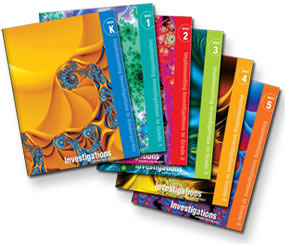Tour of a Unit
Each Investigations Unit is made up of the following sections. (Note that many of the features described here can be seen in the sample Sessions available in Curriculum by Grade Level.)
Introduction and Overview
Each unit begins with pages that introduce the curriculum, the curriculum units, and the content of that unit. These pages include an Overview of This Unit, essays about Mathematics in This Unit, and, in number and operations and patterns and functions units, Algebra Connections in This Unit. Other pages offer an overview of Assessment (including unit Benchmarks), Classroom Routines or Ten-Minute Math, Practice and Review, and Differentiation in the unit.
Investigations
Each curriculum unit is divided into Investigations. An Investigation focuses on a set of related mathematical ideas, coordinating students’ work in hands-on activities, written activities, and class discussions over a period of several days. Investigations are divided into one-hour sessions, or lessons.
Each Investigation opens with a page about the mathematics in that Investigation, and an Investigation Planner that provides an overview of the Sessions; lists the relevant student pages; and describes the preparation necessary, including gathering and preparing materials and suggested readings.
All Sessions include the following features: Math Focus Points, which highlight the goals and mathematical content of each session; Today’s Plan, which provides an overview of the Session, lists the necessary materials, and specifies the amount of time and the kind of grouping (e.g. whole class, pairs, individually) for each activity; the day’s Classroom Routine or Ten-Minute Math write up; from one to three Activities; minis of the Masters, Transparencies, and Student Activity Book pages used in the Session; and Session Follow-up, which lists homework, daily practice possibilities, and references to relevant pages in the Student Math Handbook.
There are four kinds of activities that make up the Sessions: Activities; whole-class Discussions, during which students compare methods and results and share conclusions; Math Workshop, which is a structure in which students work on a set of related activities; and Assessments, during which students are assessed through either written activities or observations. Many activities include an Observing the Students section, which provides questions to think about as you watch students at work on the math, and Differentiation suggestions (i.e. Interventions, Extensions, and English Language Learner suggestions) for Supporting the Range of Learners in the classroom. The mathematical goal of every Discussion is specified in the Math Focus Points for Discussion.
Many Sessions also include: a Vocabulary Box that specifies important mathematical terms that will be used in the Session; sidebar notes about mathematics, about instruction and pedagogy, about assessment, and about helpful readings; classroom photographs; images of student work; and examples of the kinds of things “Students might say:” in response to a particular question.
Professional Development
Teacher Notes are essays that provide further practical information about the mathematics content and how students learn it. Many of the notes were written in response to questions from teachers or to discuss important issues that arose in field-test classrooms. They offer teachers help with thinking about mathematical ideas that may be unfamiliar to them; they also provide guidance for observing and assessing students’ work.
Dialogue Boxes reflect classroom scenarios related to the activities of the unit and are based on actual teacher-students interactions. They offer examples of how students typically express their mathematical ideas, what issues and confusions arise in their thinking, and how some teachers have chosen to guide particular class discussions.
Student Math Handbook
The Student Math Handbook pages related to/referenced in the unit are pictured, in miniature form.
Index in This Unit
An index at the back of each unit provides a reference to the key activities, vocabulary, and topics contained in the unit.
Go to Ordering for information about purchasing the units from Pearson, the publisher of Investigations.
